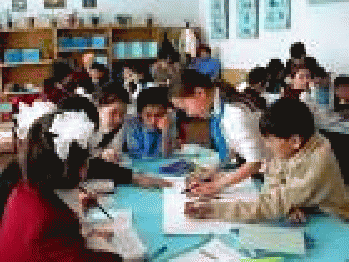
Free picture: children, school, Turkestan, city, participating ...725 Ã-- 544 - 85k - jpg
(Image by pixnio.com) Details DMCA
[This is one chapter from an old manuscript, that I'm revisiting and trying to bring to life. Ironically titled perhaps, "Have Fun Teaching!" Four of the chapters were published in Learning Magazine, but the original ms is from 1989 and needs some upgrading. The basic principles are still valid, imho, for any adult working with a class of kids, and equally so, for world leaders, as should be obvious... feedback encouraged, and typos noted equally so. dg]
"Great men are those who see that thoughts rule
the world," wrote Ralph Waldo Emerson.
"Great teachers," it might be added "are those
who see that thoughts rule the classroom, and that the vehicle for those thoughts
is the choice of words the teacher makes." Thus it is that the words you use
control the atmosphere of your classroom, wether you are aware of it or not.
It is the choice of words we use in the classroom that I would like to discuss in this chapter. The power they exert on children is often greater than most adults, including teachers, seem to be aware of. I base this statement on over a decade of watching interactions between adults and teachers, and extensive experimentation with the choice of words in my own classroom.
The ability to use the right words to accomplish chosen goals in the classroom looks to be, on the surface, an intuitive sort of ability that one is born with or one isn't. This may be true to a degree, but on the other hand I would say that my own use of words to affect behaviors and attitudes that I consider desirable--such as intellectual activity, emotional maturity, personal self-esteem-- increased immensely over my years in the classroom. And I can instantly spot many misuses of words by other adults who are trying to work with children, misuses that could easily be avoided with a little awareness of how what they are saying is coming across to the listeners.
One year when I worked as a resource person, my room had a common wall with a fourth grade teacher why I considered to be highly intelligent, extremely caring, more than sufficiently dedicated, and well prepared each day. Yet as a teacher and provoker of thought on the part of the children, she was near the bottom end of the scale of possibility, as shown by the attention the kids and her class paid to her most of the day.
What accounted for this failure in light of this woman's excellent qualities? Simply put, she turned her voice up to a foghorn level, and held it there, with few breaks in between, for what seemed like the better part of the day, and for all those times when she was trying to instruct the class. I thought much of this woman and respected her, but could never figure a tactful way to bring this problem to her attention. I never did, but sat listening to her blaring away through the year, knowing that her kids were sitting there largely thinking of other things. I was glad I wasn't one of them.
"Blaring out" has many detriments, and in this classroom one could find them all. There is the vicious cycle of loudness that goes like this: The kids begin talking in their groups instead of whispering or being quiet; the teacher talks louder to be heard while giving directions; the overall level of noise is up; the kids talk louder to each other to be heard; the teacher's voice climbs a few octaves to give directions that, presumably, will drown out the talkers; the overall level is up again; and so on. It sounds almost ridiculous as I put the words to paper, yet I have seen it happen time and again, and indeed caused it to happen time and again in my own classroom.
Not only is this ineffective, but it drains your energy and causes sore throats, headaches, stress, and undoubtedly other ailments.
So what is the alternative to this common classroom malady? I think all that follows falls in this category, but I'll start with this one: Resolve to NOT to blare out, under any circumstance, to accomplish your desired goals in the classroom. This may at first seem impossible, and probably it is without considerable practice. Also, there are times when you might legitimately choose to blare out for certain effects, such as waking up a sleeping class or announcing a fire.
However, by making a sustained, conscious effort to never raise your voice in the class, your force yourself to think much more about what you can say, in a more reasonable way, to get behaviors you want and that will be most conducive to learning atmosphere.
The other day a student's mother came in to conduct a class project. Kids were excited, out of their seats, talking loudly, and roaming around waiting to begin, since we had just come back from lunch. Wanting the helping mother to feel in charge, I said nothing to get the kids ready. When the mother turned to me to ask if she could begin, I said, "Whenever you want. Just tell them you'll start when they're quiet and in their seats."
She quietly made that announcement, and within ten seconds almost everyone was quietly in their seat; a few stragglers were beginning being extorted by their neighbors to hurry to their seats; in twenty seconds there was no movement and you could practically have heard a pin drop.
What would have happened if the adult in charge simply said, "Go to your seats," or "Everyone sit down"? Maybe she would have gotten the same results, but I can about guarantee she would have had to say it several times and it would have taken considerably longer for the kids to get there.
Next Page 1 | 2 | 3 | 4 | 5 | 6 | 7 | 8
(Note: You can view every article as one long page if you sign up as an Advocate Member, or higher).





